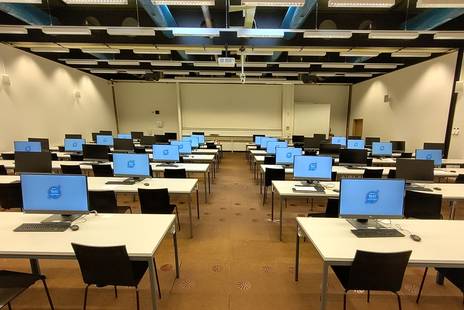Round 2 Blog

Saturday 09.03.2024 (Yaël)
This blog post only exists in the 4.2% of possible Universes in which the chronicler didn’t fail to implement tram tickets (and didn’t forget he agreed to write this blog post (and had time to actually do it (uhhhh lots of nested brackets)(but still a valid bracket sequence))).
When I arrived in Renens, I first had to pick up Ursus and Lionel who wanted to go in the wrong direction (spoiler alert!: a common mistake). In the metro (which, obviously, was driving above the ground), we met half the participants of the second round. Including Hannah, who had written that she didn’t want to wait for us. But Kimi was missing (more about this later).
At the EPFL, we almost wanted to play a round of Find Elias:sup:`TM` [1], but didn’t stand a chance as he and 6 other people were at the Physics Olympiad. At the contest hall, we were tortured by our leaders who had already brought the snacks and sandwiches, but forbade us to take any (this absolutely prevented someone anonymous [2] from permanently borrowing a farmer bar). From this point on, I will continue by recounting the approved official version of events.
Basically, everything is Kimi’s fault for arriving late, or at least for deciding that visiting Zürich on the way from Bern to Lausanne was a good idea. That is, the practice contest starting exactly at the time the email said the normal contest would begin, me getting 0 points on said contest, waiting even longer for the food and the actual contest starting at 15 minutes before the time at which it would have been one hour late didn’t have any connection with hypothetical laptops not having the right OS yet and the contest not being ready. We just wanted to wait for everyone to maintain the fair chances. At least, we still have a quote from the Sarnen Camp which tells us that no problem ever existed:
SOI contests always start on time – Johannes
This was certainly true for some given value of time.
Apart from the 3 hours I struggled (and failed) to implement a DP problem called tram tickets, the contest went pretty well for me. Other than this, nothing interesting happened according to all the participants I asked.
In the evening, we went to an Asian restaurant where Hannah tried to order something vegetarian and failed. Also, there were so many choices that we were unable to decide what we wanted.
The last and unimportant step of this day was to go to the youth hostel to get some sleep [3]. One group wanted to play Tichu, but everyone had thought someone else would bring one, so we asked Mark. Unfortunately, the people in his room were already sleeping, but hey, that’s only good for the fair chances in the next contest! [STRIKEOUT:We tried to break these chances by pressuring Theo, who was in our room, to show us the solutions from the contest, but this is a bad ending of a blog post, so pls delete this phrase.]
| [1] | See the CEOI Blog post |
| [2] | absolutely not me |
| [3] | huh, what’s this? |
Sunday 10.03.2024 (Jovian, Andrej)
In the intricate tapestry of academic challenges, EPFL’s recent programming contest emerged as a vibrant thread, weaving together moments of intensity, camaraderie, and unexpected twists. Held amidst the hallowed halls of École Polytechnique Fédérale de Lausanne, the event served as a nexus for burgeoning talents and seasoned veterans alike, each seeking to unravel the complexities of algorithmic problem-solving.
The tapestry of events unfurled with a dramatic flourish as Andrej, a participant of notable repute, made a timely entrance, arriving a mere five seconds before the contest’s commencement. His eleventh-hour arrival, akin to a deftly woven strand, added an aura of suspense to the proceedings, setting the stage for what was to come.
As contestants delved into the challenges laid before them, they encountered the enigmatic task christened “SBB,” a veritable tapestry of perplexity and intrigue. However, beneath its facade lay an absolute troll, testing the mettle and resolve of even the most seasoned competitors.
Amidst the fervent exchange of algorithms and strategies, a curious sight unfolded—a tapestry of diversity as participants hailing from the math Olympiad fraternity indulged in spirited rounds of Tichu, the crown jewel of card games. These interludes, woven seamlessly into the fabric of the contest, offered moments of respite and joviality amidst the rigors of problem-solving.
Yet, the tapestry of participation bore witness to a peculiar absence, as a third of the cohort found themselves ensnared by the allure of the physics Olympiad, their absence a subtle yet discernible gap in the fabric of the event.
The initial challenges, denoted as P1 and P2, presented themselves as threads easily navigated, their solutions unfolding with a fluidity that belied their complexity. However, amidst the chatter and exchange of insights, a mention of a random Codeforces problem by Jovian sparked a new thread in the tapestry of the contest. Andrej, spurred by curiosity, resolved to tackle the challenge, embarking on a quest for solutions amidst the eclectic ambiance of a restaurant dubbed “Holy Cow.”
Throughout the tapestry of scores and standings, a recurring motif emerged—a shared passion for the craft of programming, binding participants in a common pursuit of excellence. Even as the final tallies were unveiled, the echoes of Tichu games past resonated, a testament to the diverse tapestry of experiences that characterized the contest.
In retrospect, EPFL’s programming contest stands as more than a mere competition—it is a tapestry woven from the fabric of determination, collaboration, and unforeseen twists, each thread contributing to a rich and vibrant narrative of intellectual pursuit. As participants disperse, carrying with them memories of challenges overcome and friendships forged, they leave behind a tapestry of moments that will endure in the annals of academic endeavor.